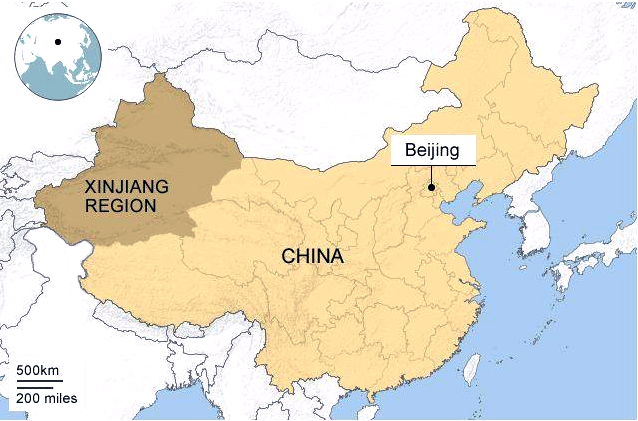International Relations
US Imposes New Sanctions on China
- 17 Dec 2021
- 7 min read
For Prelims: Uyghurs Muslims, Declaration for Uyghur Muslims, location of Xinjiang
For Mains: Sanctions on several Chinese biotech and surveillance companies, Human right violations in world, Issues related to Uighur Muslims
Why in News
The U.S is imposing new sanctions on several Chinese biotech and surveillance companies and government entities over human rights abuses of Uyghur Muslims in the Xinjiang region of China.
- Xinjiang is technically an autonomous region within China — its largest region, rich in minerals, and sharing borders with countries like India, Russia, Mangolia and Afghanistan.
Key Points
- US Sanctions:
- The US Commerce Department is targeting China’s Academy of Military Medical Sciences and its 11 research institutes that focus on using biotechnology to support the Chinese military.
- The US Treasury Department is also set to issue penalties against several Chinese entities.
- The move will bar American companies from selling components to the entities without a license.
- The US administration supported bipartisan legislation that bans imports into the U.S. from Xinjiang unless companies can demonstrate the goods were not produced by forced labour.
- Earlier, in 2020 the United States House of Representatives approved a legislation calling for sanctions on Chinese officials responsible for oppression of Uighur Muslims.
- The bill calls for sanctions against those responsible for repression of Uyghurs and other Muslim groups in China’s Xinjiang province.
- The bill also calls on USA companies or individuals operating in the Xinjiang region to take steps to ensure their products do not include parts using forced labor of Uyghurs.
- The US Commerce Department is targeting China’s Academy of Military Medical Sciences and its 11 research institutes that focus on using biotechnology to support the Chinese military.
- Declaration for Uighur Muslims:
- Recently, 43 countries have signed a declaration, calling on China to ensure full respect for the rule of law for the Muslim Uighur community in Xinjiang.
- The declaration was signed by the US and other countries accusing China of human rights violations and ethnic cleansing against the Uighur Muslims.
- Similar declarations in 2019 and 2020 condemned China for its policies in Xinjiang, where United States has accused Beijing of carrying out genocide.
- It also called for access to Xinjiang for independent observers, including the UN High Commissioner for Human Rights.
- It noted the existence of a large network of ‘political re-education’ camps in Xinjiang Uighur Autonomous Region, where over a million people have been arbitrarily detained.
- However, China claims its camps to be ‘educational centres’ where the Uighurs are being cured of “extremist thoughts” and radicalisation, and learning vocational skills.
- China’s Stand:
- China claims that Uighur groups want to establish an independent state and, because of the Uyghurs’ cultural ties to their neighbours, leaders fear that elements in places like Pakistan may back a separatist movement in Xinjiang.
- China has denied any abuses and says the steps it has taken are necessary to combat terrorism and a separatist movement.
- India’s Stand:
- The Indian government has maintained near silence on the Uighur crisis.
Uyghurs Muslims
- About:
- The Uyghurs are a predominantly Muslim minority Turkic ethnic group, whose origins can be traced to Central and East Asia.
- The Uyghurs speak their own language, similar to Turkish, and see themselves as culturally and ethnically close to Central Asian nations.
- The Uyghurs are considered to be one of the 55 officially recognized ethnic minority communities in China.
- However, China recognises the community only as a regional minority and rejects that they are an indigenous group.
- Currently, the largest population of the Uighur ethnic community lives in the Xinjiang region of China.
- A significant population of Uyghurs also lives in the neighbouring Central Asian countries such as Uzbekistan, Kyrgyzstan and Kazakhstan.
- Xinjiang is technically an autonomous region within China — its largest region, rich in minerals, and sharing borders with eight countries, including India, Pakistan, Russia and Afghanistan.
- The Uyghurs are a predominantly Muslim minority Turkic ethnic group, whose origins can be traced to Central and East Asia.
- Persecution of Uyghurs:
- Intrusion of Majority Han Chinese: Over the past few decades, as economic prosperity has come to Xinjiang, it has brought with it in large numbers the majority Han Chinese.
- They have cornered the better jobs, and left the Uyghurs feeling their livelihoods and identity were under threat.
- This led to sporadic violence, in 2009 culminating in a riot that killed 200 people, mostly Han Chinese, in the region’s capital Urumqi.
- Supression by State: Uighur Muslims for decades have suffered from abuses including persecution, forced detention, intense scrutiny, surveillance and even slavery.
- Systematic Effort to Suppress Uyghurs: U.S. intelligence has established that China has set up a high tech surveillance system across Xinjiang that uses biometric facial recognition and has collected DNA samples from all residents, ages 12 to 65, in Xinjiang as part of a systematic effort to suppress Uyghurs.
- China is choosing to use these technologies to pursue control over its people and its repression of members of ethnic and religious minority groups.
- Intrusion of Majority Han Chinese: Over the past few decades, as economic prosperity has come to Xinjiang, it has brought with it in large numbers the majority Han Chinese.
Way Forward
- All the countries should reconsider their position and urge China to immediately stop the persecution of Muslims and the prohibition of Islam in Xinjiang.
- It should adopt multiculturalism and accept the Uyghurs and other Turkic Muslims of China as ordinary citizens equal to native Chinese.







